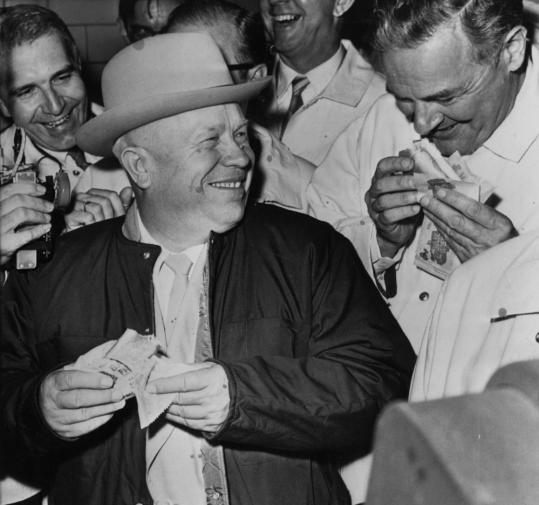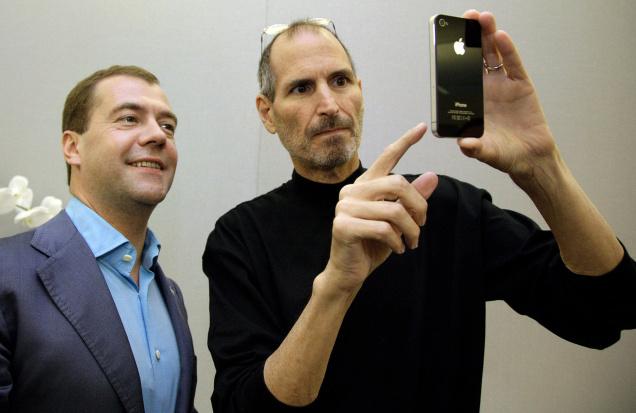US-Russian Relations: Wooing the West

The Russian leader has re-enacted the famous American goodwill tour of his predecessor a half century ago, but faces the same Cold War scheming. Will his attempts to befriend Europe have more success?
The past two years have witnessed a much more pliable Russia, retreating from the fiery rhetoric of Putin concerning NATO, the war in Afghanistan and America’s targetting of Iran. Russian President Dmitri Medvedev has turned Russian foreign policy around, playing to US. He signed the new START treaty, agreed to transit war materiel to Afghanistan, and supports US-sponsored sanctions against Iran. To crown his charm offensive, he made a photo-op visit to the US last month to meet not only his “reset” friend in the White House, but business leaders such as Apple CEO Steve Jobs in Silicon Valley, much like his predecessor Nikita Khrushchev rubbed shoulders with American farmers a half century ago.

Khrushchev samples a hot dog in Iowa
At the same time, Russia is pursuing a less spectacular tack, one which is perhaps more important in the long term, to win over Europe. This process began under ex-president Vladimir Putin and is now gathering momentum. Integration into Europe is the name of the game. The proposed new European security treaty unveiled last year was a serious offer. The new EU-Russia Political and Security Committee, chaired jointly by EU High Representative Catherine Ashton and Russian Foreign Minister Sergei Lavrov, announced that Trans-Dniestr may soon see the withdrawal of Russian troops, there since 1991, to be replaced by a joint European-Russian peacekeeping contingent. The European Parliament last month approved a resolution for visa-free travel with Russia. As the US flounders in Afghanistan, the accommodation with Europe becomes a reality.
So it is important to see the current Russian wooing of America as part of a two-track policy: to get Europe to continue to improve relations, it is necessary to keep the prickly Americans onside. Top on the agenda is ratification of START, now being debated in both US and Russian legislatures. Both Medvedev and United States Barack Obama have staked their careers on getting the treaty ratified. Medvedev’s recent trip was intended to show his unthreatening boyish demeanour, to lavish praise on US high tech, and disarm Cold Warriors in the Senate who threaten to derail the treaty. His allies even include Henry Kissinger who praised the treaty. Medvedev warned if it is not ratified simultaneously, the two countries would revert to some kind of Soviet past, when Russia was “cheated” by US non-ratification.

Medvedev receives an iPhone 4 from Apple Inc. CEO Steve Jobs on his tour of Silicon Valley
Russia’s accession to Washington’s demand for new UN sanctions against Iran could be dismissed as a meaningless gesture if it wasn’t for the subsequent cancellation of the S-300 missile contract. Russia signed the contract in 2005, when its relations with the US were at an all-time low after US-supported colour revolutions in Kyrgyzstan, Georgia and Ukraine. Russia finished assembling the missile systems in 2009 but has now admitted openly that it was cancelling the agreement due to pressure from Washington. The cancellation of the contract was a coup for Washington, and a blow to those who have come to expect Russia to take an independent role in world crises. It is also an expensive move, costing Russia up to $400m in a forfeit penalty, in addition to the $800m value of the sale, and could come back to haunt Medvedev.
It came as a surprise to many. As late as April, Mikhail Dmitriev, the head of the Russian Federal Service for Military-Technical Cooperation, said that Russia was planning to deliver the missiles. Even after the 9 June UN Security Council vote approving the new sanctions, Foreign Ministry spokesman Andrei Nesterenko said “Russia is in no way bound by the UN Security Council resolution in relation to supplies of the S-300 air-defense systems to Iran, and work on that contract is underway.” Foreign Minister Sergei Lavrov supported the deal to the end, saying on 11 June the decision to cancel would require a decree from the president.
Commentators in the Russian media have been highly critical. Defence Ministry adviser Ruslan Pukhov said that Iran, which has been buying $500 million worth of arms from Russia annually, could now turn to China for its future weapons and military equipment needs. Iran has already cancelled plans to purchase Russian civilian aircraft. “ Russia is losing the whole Middle East arms market because it wants to kowtow before America,” commentator Alexei Pushkov said. Viktor Ilyukhin, a communist State Duma deputy and former prosecutor, defended the sale, saying, “Over centuries of its co-existence with other nations, Iran has never initiated a war against any of its neighbours.”
So it was crucial that Medvedev’s trip to Silicon Valley show that his pro-American reset would bear fruit. He chummed around with Obama and met business leaders, calling for US investment in Russia, much like Soviet leader Nikita Khrushchev did a half century ago. Little did he know that the FBI had already informed Obama that it was about to bust a supposed Russian spy ring. What should have been a chance for Obama to rejoice at how thoroughly reset the reset button was, with Russian-American smiles on all fronts, became instead an embarrassing fiasco. Ten alleged Russian agents, mall-loving suburbanites one and all, were charged with “deep cover” intelligence gathering two days after Medvedev completed his tour. That it was intended to scuttle Russian-US rapprochement is shown by the fact that, having tracked the “spy ring” for a decade and touting the operation as the biggest in US history, the FBI couldn’t point to one piece of high security information changing hands.

Anna Chapman, spy
The operation can only be interpreted as a “deep cover” prank, intended to keep the Russians off-balance, despite their compliance with US demands on all fronts. The whole affair, from photo-ops in Silicon Valley to faux intrigue eerily recalls Khrushchev’s two-week US tour in September 1959 and the spy scandal that came in its wake. The Cold War was very much on. The voluble Khrushchev, eager for peace and the chance to emulate the American Dream, visited farmers, night clubs, chatted with Marilyn Monroe on a Hollywood set, charming and disarming his foes.
But when he called for disarmament the stock market lost $1.7 billion in a flash. Detente was not in the interests of either Wall Street or the Pentagon, so it came as no surprise that — unbeknownst to president Eisenhower — U2 spy flights over Russia resumed a few months later and one Gary Powers was shot in May 1960, cancelling any residual goodwill. Eisenhower had been tricked, and furious, he used his farewell speech to try to warn the American people of “the disastrous rise of misplaced power in the military-industrial complex”. But too late.
History is replaying itself in spades. Medvedev wrestles his doubters in Moscow, sacrifices good relations with Iran, lets the Taliban know Russia is still very much its enemy, gives the US its Starwars, much as Khrushchev abandoned China, put Third World revolution on the backburner, and agreed to ban nuclear weapons tests. All in the interests of world peace and improving the lot of the Motherland. Only to be made a laughing stock by a US establishment not willing to give an inch.
When asked in Riga last month about the purpose of stationing 100 US Patriot missiles 80 kms from the Russian border in Poland, NATO Secretary General Anders Rasmussen said, “I would urge Russia to forget old Cold War rhetoric.” What he really meant, of course, was: “Stop asking questions, accept whatever NATO does and unconditionally support the alliance on key issues such as Iran and Afghanistan,” says Alexei Pushkov, director of the Institute of Contemporary International Problems in Moscow. Putin pointed this out and was condemned as a crypto-Cold Warrior.
Now Medvedev is trying to say it more politely. But his softer approach falls on deaf ears. Or is taken as a sign of weakness. Current Russian foreign policy shows it is eminently possible to find accommodation on all issues. There is no need to dismember or otherwise threaten Russia. However, American hawks need it as an enemy, preferably a weak, isolated one, not a strong member of an independent Europe. This is what scares them and they will continue to scheme to prevent it.
It appears that Obama, like his legendary predecessor, genuinely wants to do good — while maintaining US hegemony in the world, of course. But he has been tripped up at every step. Will we soon have a replay of Ike’s farewell speech? And will Medvedev too suffer the sad fate of the hapless Nikita in the Kremlin?
Eric Walberg writes for Al-Ahram Weekly http://weekly.ahram.org.eg/ You can reach him at http://ericwalberg.com/

